|
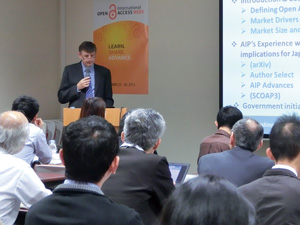
Lecture by John Haynes (American Institute of Physics, Publishing)
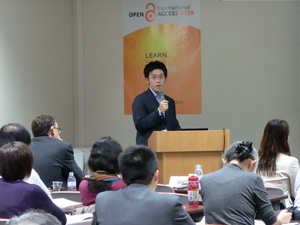
Lecture by Hayahiko Oozono (DRF, Okayama University Library)
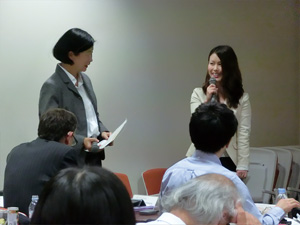
Kyoko Jo (DRF, Hokkaido University Library) (right)
Mikiko Tanifuji (National Institute for Materials Science) (left)
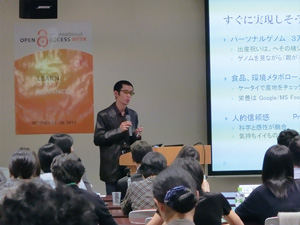
Lecture by Masanori Arita (Department of Biophysics and Biochemistry, Graduate School of Science, The University of Tokyo)
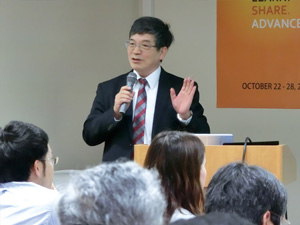
Lecture by Kenichi Ueda (Institute for Laser Science, The University of Electro-Communications)
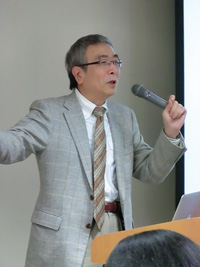
Lecture by Mitsuaki Nozaki (High Energy Accelerator Research Organization)
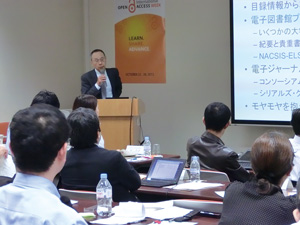
Lecture by Masamitsu Kuriyama (Department of Contemporary Social Studies, College of Human Science, Tokiwa University)
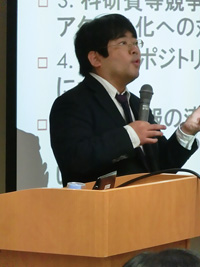
Lecture by Norihiko Uda (Faculty of Library, Information and Media Science, University of Tsukuba)
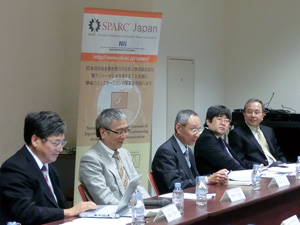
Panelists (from left): Kenichi Ueda (Institute for Laser Science, The University of Electro-Communications), Mitsuaki Nozaki (High Energy Accelerator Research Organization), Masamitsu Kuriyama (Department of Contemporary Social Studies, College of Human Science, Tokiwa University), Norihiko Uda (Faculty of Library, Information and Media Science, University of Tsukuba), and Jun Adachi (National Institute of Informatics)

Tomonari Kinto
(University of Tokyo Library)
The Sponsoring Consortium for Open Access Publishing in Particle Physics (SCOAP3 ), which was taken up as one of the themes in the seminar, is a project led by the European Organization for Nuclear Research (CERN) and aims to achieve open access (OA) to scholarly journals in the field of high-energy physics. In Japan, the High Energy Accelerator Research Organization (KEK), the National Institute of Informatics (NII), and the Japanese Coordinating Committee for University Libraries (JCCUL) jointly signed an expression of interest (EoI) in August 2011, thereby commencing substantive work toward participation in the project. Being responsible for contracts for academic journals and e-journals within the university, I became a member of the SCOAP3 taskforce in summer 2012 and have since been helping coordinate how Japanese university libraries can and should cooperate with the SCOAP3 project.
If I have to put it in a nutshell, the task is how we ask universities to contribute funds. However, the SCOAP3 is an international OA activity that came into being after long and careful consideration and should not be trivialized into a mere fundraising activity. This seminar, held on October 26, 2012 as part of the Open Access Week 2012, provided me a good opportunity to learn and think about the development to date and future prospects of OA from a broad point of view, thereby defining the activity I am engaged in within the overall picture of OA.
The seminar consisted three sessions. Presentations were made on overseas trends in OA in the first session and on those in Japan in the second session, followed by a panel discussion in the third session, where panelists discussed how OA will change research and academic activities in the future. Readers are advised to refer to the summary of the presentations and panel discussion on the NII website for more details, but I would like to note, as my overall impression of the seminar, that the discussions on the past and future of OA—made by publishers, researchers, library staff, and so forth from their respective standpoints—were very informative and fulfilling.
While listening to the seminar, I thought about the universality and multiplicity—or I might say the global and local aspects—of OA.
OA has a universal impact. Whether it is Green OA or Gold OA, articles and other contents are, in principle, made broadly accessible to everyone. At the same time, however, many problems may arise in the course of its realization. In the case of institutional repositories, for instance, there are many factors that must be determined by respective institutions. They must decide whether or not to build such a repository to begin with, and if they do, they must set the scope of and requirements for contents to be recorded. Also, there is no uniform set of criteria to determine whether or not academic societies should publish OA journals because the answer would differ depending on the area of study as well as on the size and financial standing of each organization.
The SCOAP3 , referred to at the beginning of this article, do not collect article-processing charges (APCs) from authors. Instead, it seeks to achieve OA by redefining current subscription fees paid by libraries as publishing fees. The funds thus collected are to be contributed to the SCOAP3 at a national level. However, with each country having its own circumstances, both the scope of universities covered and the way in which each country collect fund are far from being uniform. I saw this reality first hand when I, together with Professor Adachi of the NII and my colleagues at the University of Tokyo Library, attended the meeting of the SCOAP3 ’s technical working group held at the CERN in September 2012. The technical working group is composed of members from major participating countries. During the meeting, there was a fierce exchange of words between the representatives of a certain country, who were having difficulty persuading libraries and making necessary adjustments within the designated time frame, and those of the CERN, who wanted to proceed according to the agreed time schedule and method. In the end, the meeting was saved, which I somewhat optimistically attribute to the fact that the both sides share the underlying philosophy of OA. Watching how representatives from various participating countries overcame their respective local factors and adjusted differences and conflicting interests, I felt as if I were watching some sort of multilateral diplomacy.
Such local differences can be observed in various stages in the course of realizing OA. For instance, lecturers at the seminar were divided in their opinions concerning the retention and release of research data. It is not clear whether this division in opinions is due to differences in the fields or generations. However, so long as they share sympathy to OA, it would not escalate into an irreconcilable confrontation. Going forward, libraries will be increasingly involved with OA and we will be expected to play a role in overcoming local differences within and without our own universities.
By the way, Ms. Tanifuji, who served as moderator for the seminar, asked each speaker to answer, before making his or her presentation, the following two questions: “What profession other than your own would you like to attempt?” and “What profession would you never attempt?” Needless to say, all of the speakers have become what they are today to speak before the audience at the seminar after making many choices—both big and small ones—in the course of their lives. Thinking about what could have been can help thinking about the future. The same can be said about thinking about the future of OA.
How did they respond to the questions? Their answers can be found in the video posted on the NII website and readers are invited to take a look.
* In addition to Professor Mitsuaki Nozaki’s presentation at the seminar, the following works of literature on SCOAP3 were used as references:
- Mitsuaki Nozaki, “SCOAP3 towa Nanika? [What is SCOAP3 ?].” SPARC Japan News Letter. no. 15, 2013, p. 1-4.
- Jun Adachi, “SCOAP3 no Genjo, Kadai, Soshite Tenbo [Current Status, Challenges, and Prospects of SCOAP3 ].” Nihon Butsuri Gakkaishi (Butsuri). vol. 68, no. 1, 2013, p. 50-51.

Hirofumi Seike
(Representative Office Japan, Royal Society of Chemistry)
To begin with, I would like to briefly explain the basic stance of the Royal Society of Chemistry (RSC). The RSC has expressed its intention to respect and support the mode preferred by the chemical community, whether it is the conventional subscription model or any OA model. Needless to say, this is predicated on the premise that the new model is a fair and sustainable model and can fulfill its role as a scientific, technical, and medical publisher as has been done by the conventional publishers. While there has been a significant shift to OA publishing in bioscience and some areas of physics, it is fair to say that the chemical community has been taking a conservative stance on OA. One of the concerns often heard from chemists is the problem of article-processing charges (APCs) accompanying the shift to OA. Last year, the RSC launched an initiative called “Gold for Gold,” an experimental attempt to subsidize part of publishing fees as the British chemical community begins the transition to OA. Under the initiative, UK research institutes subscribing to RSC Gold receive vouchers in an amount equal to the RSC Gold subscription paid if they opt for OA, so as to reduce researchers’ burden to pay publishing fees. Having received favorable feedback in the United Kingdom, the Gold for Gold initiative has become applicable to researchers across the world including those in Japan starting this year. We hope that many Japanese chemists will take advantage of this initiative to publish their articles in OA journals and, based on this experience, tell us their frank opinions as to what roles the RSC should play as an academic society publisher.
Also, there have been some interesting discussions on data searching and repositories. Regarding data searching, Dr. John Haynes referred to the RSC’s ChemSpider (http://www.chemspider.com/). Although I did not mean to be self-applauding but let me briefly introduce this. ChemSpider is a free Internet portal that provides anyone access to information on the physical and chemical properties of over 27 million chemical compounds, collecting data by linking more than 400 databases. While being a terabyte search engine designed to search for chemical structures and associated information, ChemSpider is also serving as a “community” for chemists where various information gather through cloud sourcing in information collection and management and hence it is useful in digging out “buried” information. As journals and databases increasingly shift to OA, the role played by information search engines such as ChemSpider will become greater than ever. Meanwhile, what I personally found very interesting is that various opinions were expressed on the role of libraries with regard to repositories. It seems that how to redefine the role of libraries in a broad sense is now being discussed around the world. If I can cite my personal experience, I was asked for my opinions on the redefinition of the role of libraries when I met with Dr. Allen Aloise, director of laboratories at Harvard University’s Department of Chemistry and Chemical Biology, in September 2012. As it appears, it is often an attempt to reexamine the raison d’etre of libraries as a physical presence as more publications are being made available online. However, now that we are entering into the era of Big Data, I believe that libraries will be playing an increasingly important role as an agency specialized in the handling of diverse kinds of data.
It is often said that science is a universal language. However, support systems—including research systems and funds—would differ across different countries and research areas. Needless to say, there are differences in national policies and conflicts of interest between different countries. Given its global nature, the promotion of OA and data sharing will likely to give rise to a great deal of confusion. As such, it is indispensable to make efforts to build a multilateral framework for cooperation. In doing so, what is the most important for Japan is how to reflect its intentions in the framework. The new framework for the distribution and management of scholarly information, which is now being built, will definitely have a significant impact on the behavioral pattern of scientists and business communities all around the world and it is hoped that this framework will be designed in a way to facilitate further advancement of Japan. One big reason why the RSC established its office in Japan is its desire to contribute to the further development of science through close interactions and cooperation with the scientific community of Japan. I am looking forward to participating in future seminars, such as the one I attended this time, which would provide me precious opportunities to listen to opinions from those at the forefront. |

